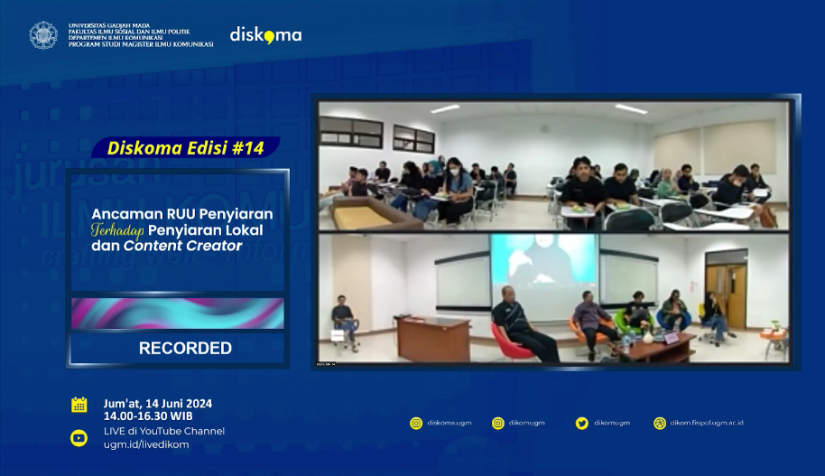
Yogyakarta, June 14th 2024─The revision of the Broadcasting Law of 2024 has sparked controversy as it threatens press freedom and artists’ creativity. The Broadcasting Bill of 2024 draft itself is a revision of the Broadcasting Law Number 32 of 2002. Responding to communication issues related to journalism, Master of Communication UGM held a Student Communication Discussion (DISKOMA #14) entitled “Threat of Broadcasting Bill to Local Broadcasting and Content Creators” on Friday (14/06).
Technological developments bring changes to new media and open up the technological paradigm significantly, with its latest logic demanding regulations that are adaptive and relevant to the times. Unfortunately, the available regulations have not been able to fully accommodate the changes that have occurred.
“The current bill is still mixed. Broadcasting regulation should be able to prosper Indonesian people not only economically, but also politically, and encourage culture and education to develop,” said Rahayu, a Lecturer of the Department Communication Sciences of UGM & PR2Media.
Broadcasting media in Indonesia is not only a business institution, but also a social institution as a pillar of democracy. According to Rahayu, broadcast media has a communication function for the public to access information and entertainment, express opinions, present identity and become a medium of social monitoring such as the government. But in fact, the realization of these functions is still questionable in Indonesia.
“It is better to make regulations that explicitly regulate the regulation of media structures. Because perhaps what is most needed at this time is a media structure that leads to a better direction,” said Rahayu.
Hazwan Iskandar J, Chairman of the Regional Indonesian Broadcasting Commission (KPID) of the Special Region of Yogyakarta, responded to criticism of the Broadcasting Bill as a political process in which every law making and drafting has many interests in it. However, Hazwan emphasized that the revision is principally for the benefit of the nation’s children in consuming good and healthy information.
In addition, critics of the Broadcasting Bill also highlighted Indonesian Broadcasting Commission’s (KPI) expansion in digital broadcasting regulation, especially Over The Top (OTT) and User Generated Content (UGC) services. Wahyu Sudarmawan, President Director of RBTV, said that the existence of new digital media such as social media requires creative workers to be more adaptive.
“Nowadays, the audience has become an active audience, so we need to be adaptive by studying the audience culture. One of them is mapping and analyzing the audience culture,” he explained. Wahyu added that social media monitoring can also be assisted by independent development to monitor content on social media.
Meanwhile, in line with Rahayu’s opinion regarding the ambiguous Broadcasting Bill, Umar Wicaksono as Head of Creative PARES.id mentioned his concern regarding the rubber articles in the Broadcasting Bill. According to him, instead of taking care of content creators’ content, the government can intervene in the guidelines provided by each social media and adjust them to the community guidelines in Indonesia. Hopefully, appropriate policies can contribute to the Sustainable Development Goals (SDGs), specifically point number 16, which is peace, justice and resilient institutions.
